Individual Research Portfolio: People Management Strategies in the NHS
VerifiedAdded on 2023/02/01
|8
|2429
|73
Project
AI Summary
This individual research portfolio examines people management within the UK's National Health Service (NHS), focusing on three key areas: understanding the knowledge, behaviors, and skills of effective people managers; evaluating key HR processes for performance management; and analyzing contemporary issues faced by line managers. The portfolio addresses challenges such as staff shortages, high staff turnover, and the reliance on agency staff, which impact morale and patient care. It explores various leadership styles, including transformational leadership, and HR strategies like training and development programs. The portfolio also delves into the impact of factors like technology, economic conditions, and organizational environments on leadership and management styles. Furthermore, it highlights the importance of employee motivation, the impact of agency staff on permanent staff, and the significance of talent management in the NHS, including the implementation of e-rostering and flexible working. The conclusion emphasizes the crucial role of leadership and management in improving healthcare services and employee satisfaction.

Individual research portfolio
Paraphrase This Document
Need a fresh take? Get an instant paraphrase of this document with our AI Paraphraser
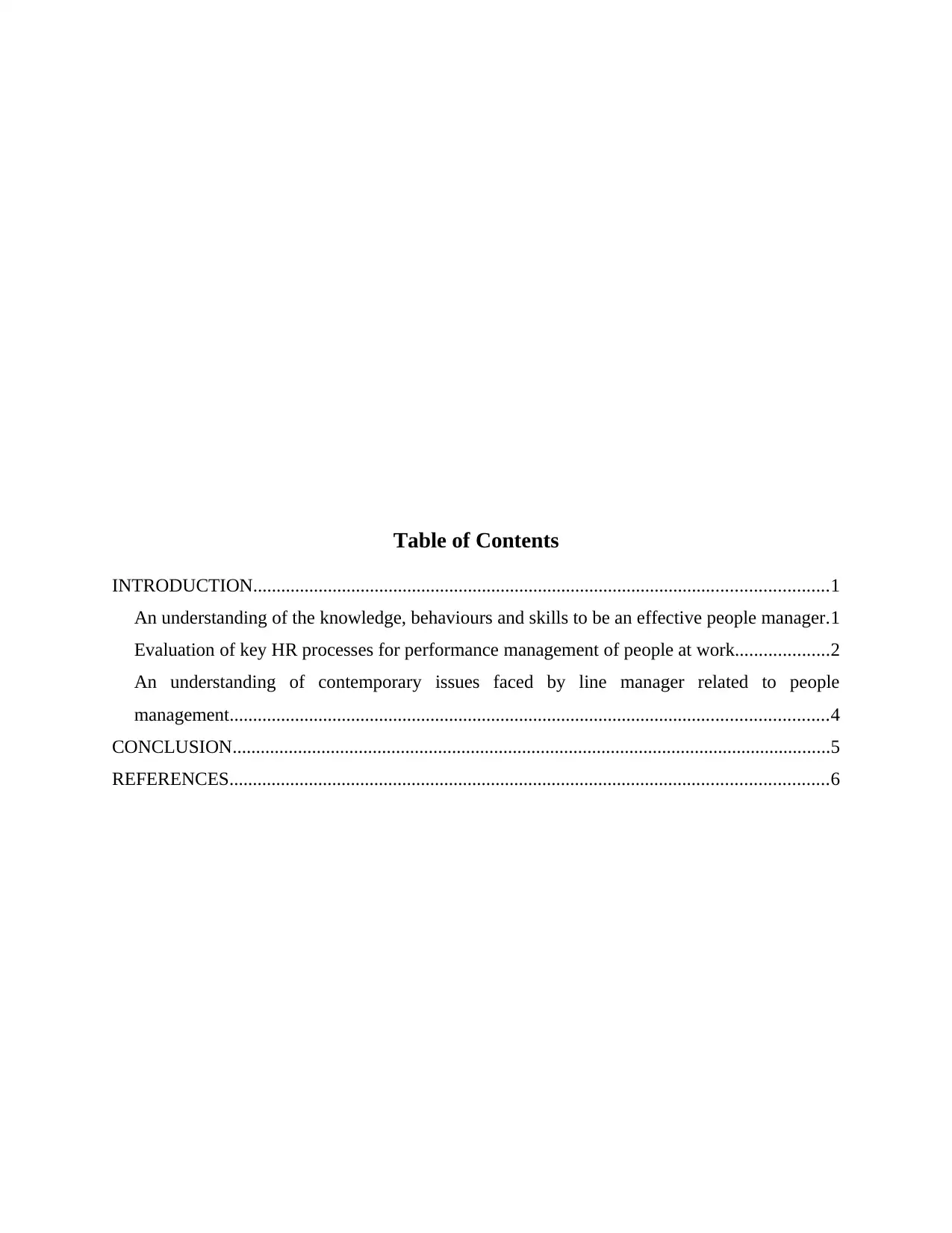
Table of Contents
INTRODUCTION...........................................................................................................................1
An understanding of the knowledge, behaviours and skills to be an effective people manager.1
Evaluation of key HR processes for performance management of people at work....................2
An understanding of contemporary issues faced by line manager related to people
management................................................................................................................................4
CONCLUSION................................................................................................................................5
REFERENCES................................................................................................................................6
INTRODUCTION...........................................................................................................................1
An understanding of the knowledge, behaviours and skills to be an effective people manager.1
Evaluation of key HR processes for performance management of people at work....................2
An understanding of contemporary issues faced by line manager related to people
management................................................................................................................................4
CONCLUSION................................................................................................................................5
REFERENCES................................................................................................................................6
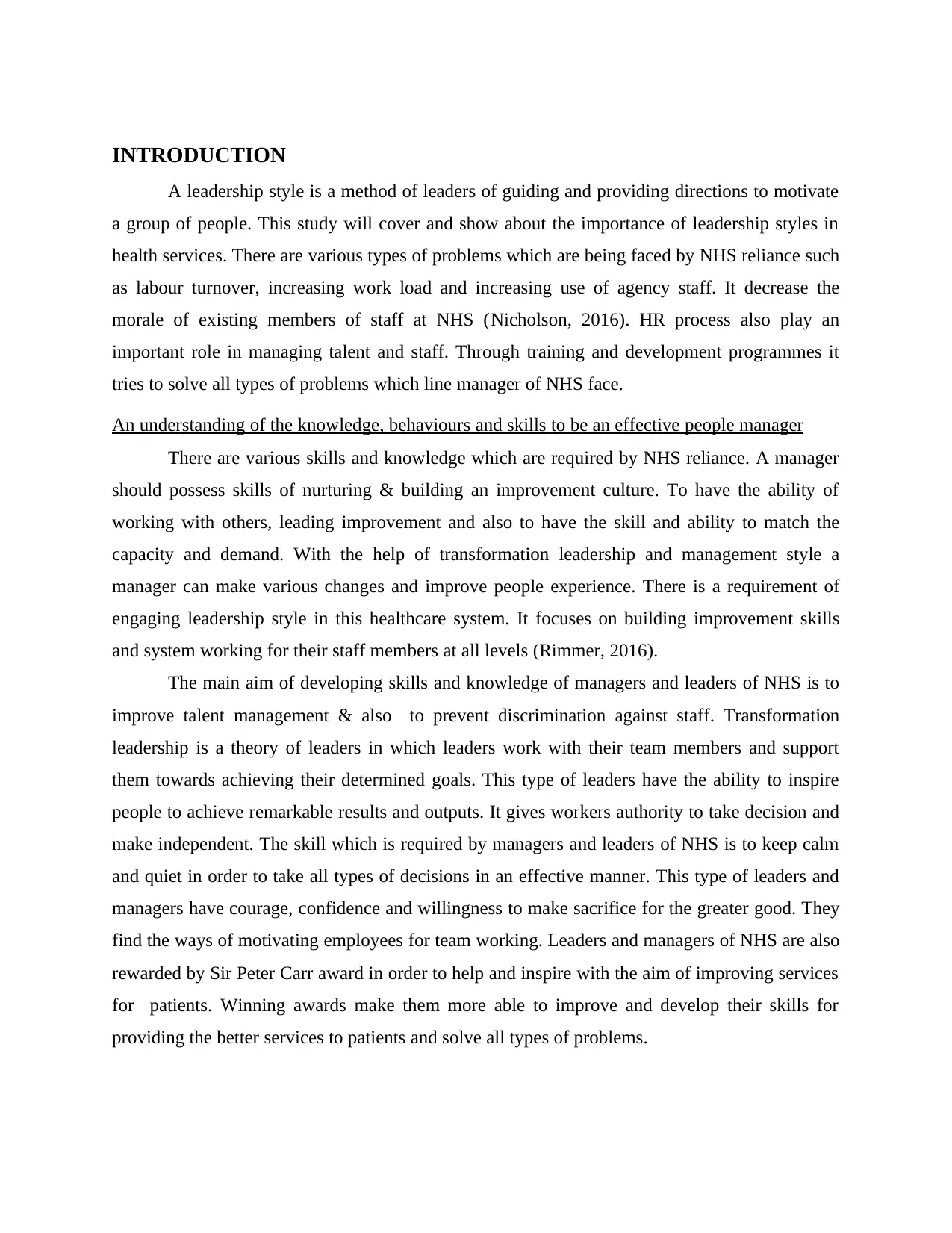
INTRODUCTION
A leadership style is a method of leaders of guiding and providing directions to motivate
a group of people. This study will cover and show about the importance of leadership styles in
health services. There are various types of problems which are being faced by NHS reliance such
as labour turnover, increasing work load and increasing use of agency staff. It decrease the
morale of existing members of staff at NHS (Nicholson, 2016). HR process also play an
important role in managing talent and staff. Through training and development programmes it
tries to solve all types of problems which line manager of NHS face.
An understanding of the knowledge, behaviours and skills to be an effective people manager
There are various skills and knowledge which are required by NHS reliance. A manager
should possess skills of nurturing & building an improvement culture. To have the ability of
working with others, leading improvement and also to have the skill and ability to match the
capacity and demand. With the help of transformation leadership and management style a
manager can make various changes and improve people experience. There is a requirement of
engaging leadership style in this healthcare system. It focuses on building improvement skills
and system working for their staff members at all levels (Rimmer, 2016).
The main aim of developing skills and knowledge of managers and leaders of NHS is to
improve talent management & also to prevent discrimination against staff. Transformation
leadership is a theory of leaders in which leaders work with their team members and support
them towards achieving their determined goals. This type of leaders have the ability to inspire
people to achieve remarkable results and outputs. It gives workers authority to take decision and
make independent. The skill which is required by managers and leaders of NHS is to keep calm
and quiet in order to take all types of decisions in an effective manner. This type of leaders and
managers have courage, confidence and willingness to make sacrifice for the greater good. They
find the ways of motivating employees for team working. Leaders and managers of NHS are also
rewarded by Sir Peter Carr award in order to help and inspire with the aim of improving services
for patients. Winning awards make them more able to improve and develop their skills for
providing the better services to patients and solve all types of problems.
A leadership style is a method of leaders of guiding and providing directions to motivate
a group of people. This study will cover and show about the importance of leadership styles in
health services. There are various types of problems which are being faced by NHS reliance such
as labour turnover, increasing work load and increasing use of agency staff. It decrease the
morale of existing members of staff at NHS (Nicholson, 2016). HR process also play an
important role in managing talent and staff. Through training and development programmes it
tries to solve all types of problems which line manager of NHS face.
An understanding of the knowledge, behaviours and skills to be an effective people manager
There are various skills and knowledge which are required by NHS reliance. A manager
should possess skills of nurturing & building an improvement culture. To have the ability of
working with others, leading improvement and also to have the skill and ability to match the
capacity and demand. With the help of transformation leadership and management style a
manager can make various changes and improve people experience. There is a requirement of
engaging leadership style in this healthcare system. It focuses on building improvement skills
and system working for their staff members at all levels (Rimmer, 2016).
The main aim of developing skills and knowledge of managers and leaders of NHS is to
improve talent management & also to prevent discrimination against staff. Transformation
leadership is a theory of leaders in which leaders work with their team members and support
them towards achieving their determined goals. This type of leaders have the ability to inspire
people to achieve remarkable results and outputs. It gives workers authority to take decision and
make independent. The skill which is required by managers and leaders of NHS is to keep calm
and quiet in order to take all types of decisions in an effective manner. This type of leaders and
managers have courage, confidence and willingness to make sacrifice for the greater good. They
find the ways of motivating employees for team working. Leaders and managers of NHS are also
rewarded by Sir Peter Carr award in order to help and inspire with the aim of improving services
for patients. Winning awards make them more able to improve and develop their skills for
providing the better services to patients and solve all types of problems.
⊘ This is a preview!⊘
Do you want full access?
Subscribe today to unlock all pages.

Trusted by 1+ million students worldwide
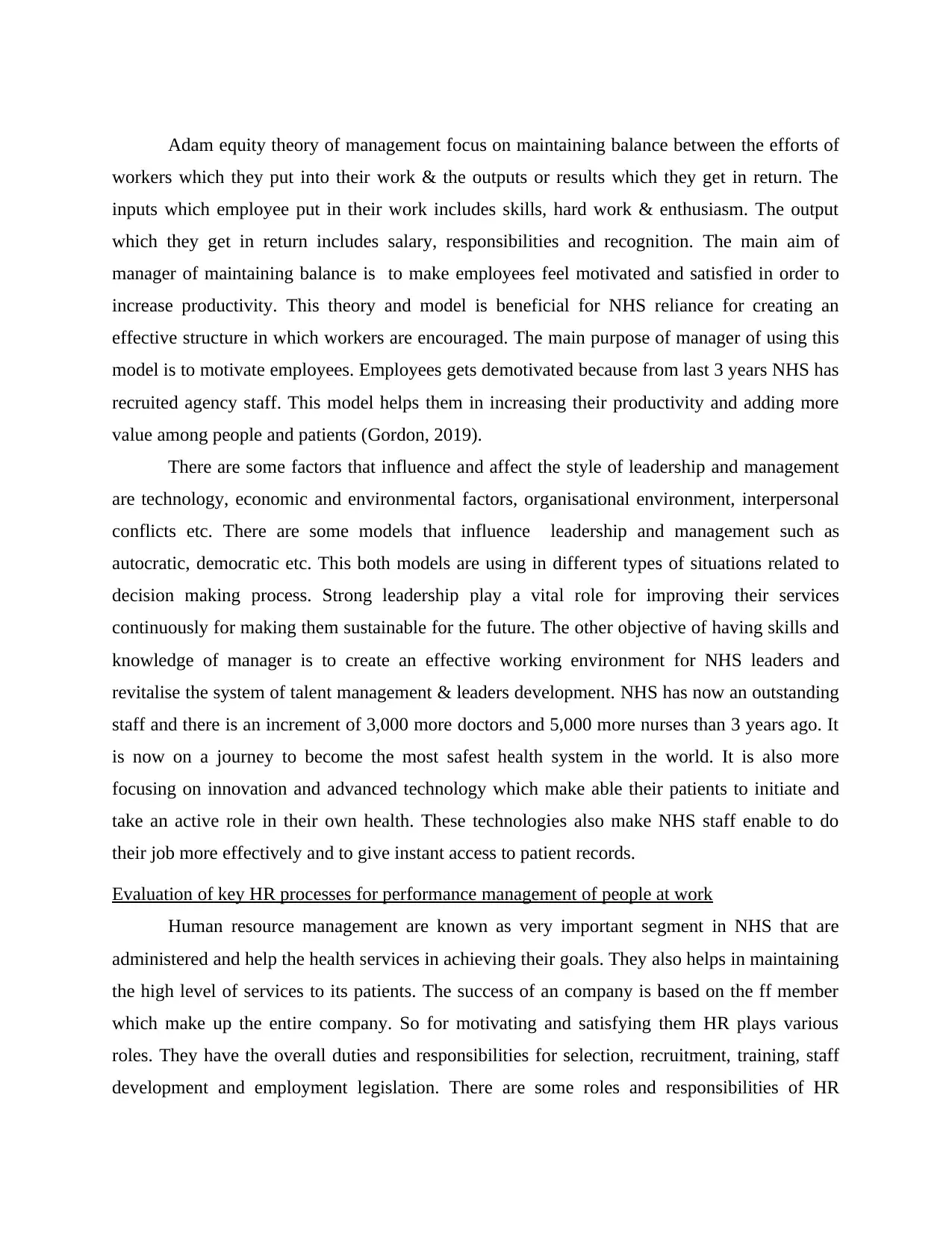
Adam equity theory of management focus on maintaining balance between the efforts of
workers which they put into their work & the outputs or results which they get in return. The
inputs which employee put in their work includes skills, hard work & enthusiasm. The output
which they get in return includes salary, responsibilities and recognition. The main aim of
manager of maintaining balance is to make employees feel motivated and satisfied in order to
increase productivity. This theory and model is beneficial for NHS reliance for creating an
effective structure in which workers are encouraged. The main purpose of manager of using this
model is to motivate employees. Employees gets demotivated because from last 3 years NHS has
recruited agency staff. This model helps them in increasing their productivity and adding more
value among people and patients (Gordon, 2019).
There are some factors that influence and affect the style of leadership and management
are technology, economic and environmental factors, organisational environment, interpersonal
conflicts etc. There are some models that influence leadership and management such as
autocratic, democratic etc. This both models are using in different types of situations related to
decision making process. Strong leadership play a vital role for improving their services
continuously for making them sustainable for the future. The other objective of having skills and
knowledge of manager is to create an effective working environment for NHS leaders and
revitalise the system of talent management & leaders development. NHS has now an outstanding
staff and there is an increment of 3,000 more doctors and 5,000 more nurses than 3 years ago. It
is now on a journey to become the most safest health system in the world. It is also more
focusing on innovation and advanced technology which make able their patients to initiate and
take an active role in their own health. These technologies also make NHS staff enable to do
their job more effectively and to give instant access to patient records.
Evaluation of key HR processes for performance management of people at work
Human resource management are known as very important segment in NHS that are
administered and help the health services in achieving their goals. They also helps in maintaining
the high level of services to its patients. The success of an company is based on the ff member
which make up the entire company. So for motivating and satisfying them HR plays various
roles. They have the overall duties and responsibilities for selection, recruitment, training, staff
development and employment legislation. There are some roles and responsibilities of HR
workers which they put into their work & the outputs or results which they get in return. The
inputs which employee put in their work includes skills, hard work & enthusiasm. The output
which they get in return includes salary, responsibilities and recognition. The main aim of
manager of maintaining balance is to make employees feel motivated and satisfied in order to
increase productivity. This theory and model is beneficial for NHS reliance for creating an
effective structure in which workers are encouraged. The main purpose of manager of using this
model is to motivate employees. Employees gets demotivated because from last 3 years NHS has
recruited agency staff. This model helps them in increasing their productivity and adding more
value among people and patients (Gordon, 2019).
There are some factors that influence and affect the style of leadership and management
are technology, economic and environmental factors, organisational environment, interpersonal
conflicts etc. There are some models that influence leadership and management such as
autocratic, democratic etc. This both models are using in different types of situations related to
decision making process. Strong leadership play a vital role for improving their services
continuously for making them sustainable for the future. The other objective of having skills and
knowledge of manager is to create an effective working environment for NHS leaders and
revitalise the system of talent management & leaders development. NHS has now an outstanding
staff and there is an increment of 3,000 more doctors and 5,000 more nurses than 3 years ago. It
is now on a journey to become the most safest health system in the world. It is also more
focusing on innovation and advanced technology which make able their patients to initiate and
take an active role in their own health. These technologies also make NHS staff enable to do
their job more effectively and to give instant access to patient records.
Evaluation of key HR processes for performance management of people at work
Human resource management are known as very important segment in NHS that are
administered and help the health services in achieving their goals. They also helps in maintaining
the high level of services to its patients. The success of an company is based on the ff member
which make up the entire company. So for motivating and satisfying them HR plays various
roles. They have the overall duties and responsibilities for selection, recruitment, training, staff
development and employment legislation. There are some roles and responsibilities of HR
Paraphrase This Document
Need a fresh take? Get an instant paraphrase of this document with our AI Paraphraser
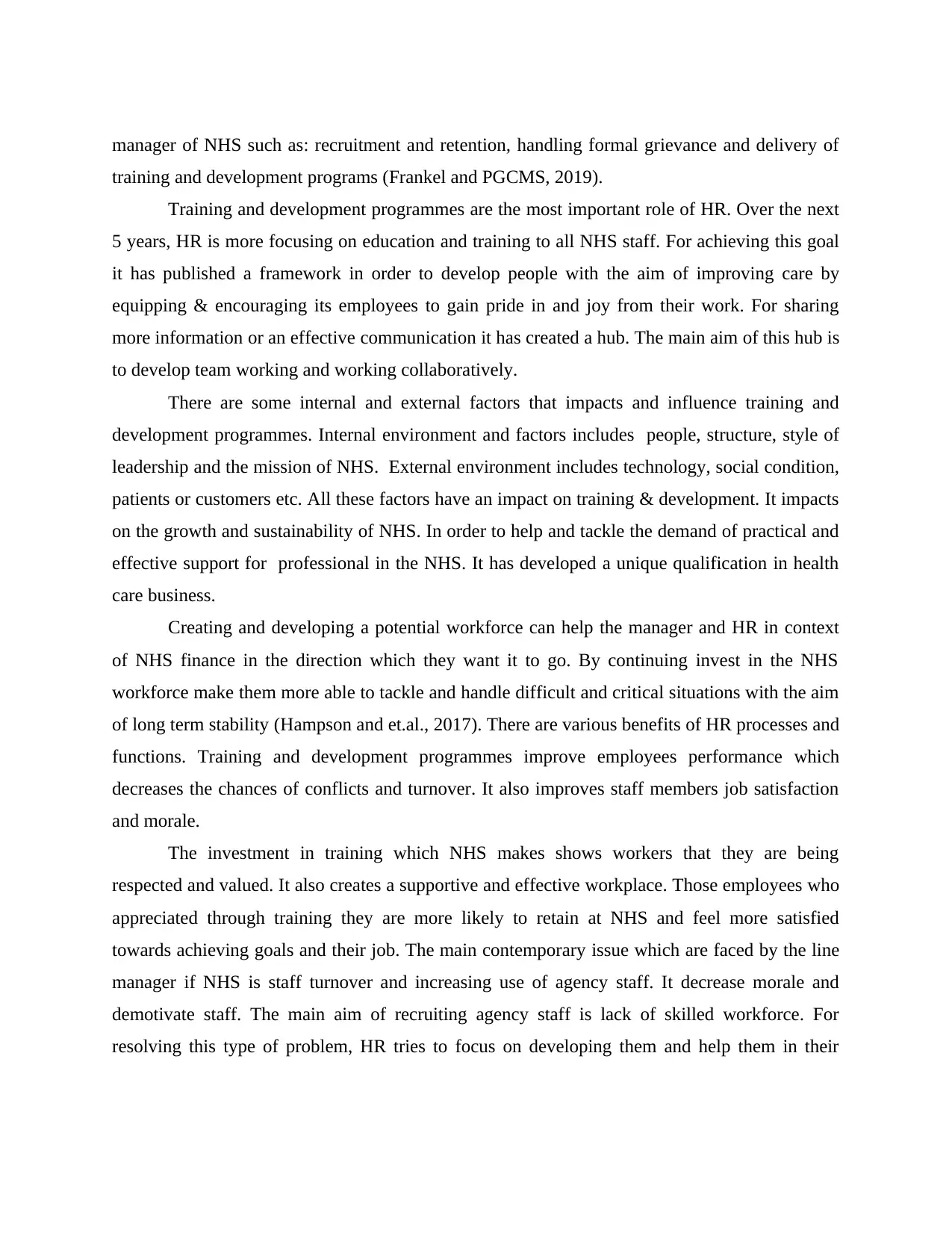
manager of NHS such as: recruitment and retention, handling formal grievance and delivery of
training and development programs (Frankel and PGCMS, 2019).
Training and development programmes are the most important role of HR. Over the next
5 years, HR is more focusing on education and training to all NHS staff. For achieving this goal
it has published a framework in order to develop people with the aim of improving care by
equipping & encouraging its employees to gain pride in and joy from their work. For sharing
more information or an effective communication it has created a hub. The main aim of this hub is
to develop team working and working collaboratively.
There are some internal and external factors that impacts and influence training and
development programmes. Internal environment and factors includes people, structure, style of
leadership and the mission of NHS. External environment includes technology, social condition,
patients or customers etc. All these factors have an impact on training & development. It impacts
on the growth and sustainability of NHS. In order to help and tackle the demand of practical and
effective support for professional in the NHS. It has developed a unique qualification in health
care business.
Creating and developing a potential workforce can help the manager and HR in context
of NHS finance in the direction which they want it to go. By continuing invest in the NHS
workforce make them more able to tackle and handle difficult and critical situations with the aim
of long term stability (Hampson and et.al., 2017). There are various benefits of HR processes and
functions. Training and development programmes improve employees performance which
decreases the chances of conflicts and turnover. It also improves staff members job satisfaction
and morale.
The investment in training which NHS makes shows workers that they are being
respected and valued. It also creates a supportive and effective workplace. Those employees who
appreciated through training they are more likely to retain at NHS and feel more satisfied
towards achieving goals and their job. The main contemporary issue which are faced by the line
manager if NHS is staff turnover and increasing use of agency staff. It decrease morale and
demotivate staff. The main aim of recruiting agency staff is lack of skilled workforce. For
resolving this type of problem, HR tries to focus on developing them and help them in their
training and development programs (Frankel and PGCMS, 2019).
Training and development programmes are the most important role of HR. Over the next
5 years, HR is more focusing on education and training to all NHS staff. For achieving this goal
it has published a framework in order to develop people with the aim of improving care by
equipping & encouraging its employees to gain pride in and joy from their work. For sharing
more information or an effective communication it has created a hub. The main aim of this hub is
to develop team working and working collaboratively.
There are some internal and external factors that impacts and influence training and
development programmes. Internal environment and factors includes people, structure, style of
leadership and the mission of NHS. External environment includes technology, social condition,
patients or customers etc. All these factors have an impact on training & development. It impacts
on the growth and sustainability of NHS. In order to help and tackle the demand of practical and
effective support for professional in the NHS. It has developed a unique qualification in health
care business.
Creating and developing a potential workforce can help the manager and HR in context
of NHS finance in the direction which they want it to go. By continuing invest in the NHS
workforce make them more able to tackle and handle difficult and critical situations with the aim
of long term stability (Hampson and et.al., 2017). There are various benefits of HR processes and
functions. Training and development programmes improve employees performance which
decreases the chances of conflicts and turnover. It also improves staff members job satisfaction
and morale.
The investment in training which NHS makes shows workers that they are being
respected and valued. It also creates a supportive and effective workplace. Those employees who
appreciated through training they are more likely to retain at NHS and feel more satisfied
towards achieving goals and their job. The main contemporary issue which are faced by the line
manager if NHS is staff turnover and increasing use of agency staff. It decrease morale and
demotivate staff. The main aim of recruiting agency staff is lack of skilled workforce. For
resolving this type of problem, HR tries to focus on developing them and help them in their
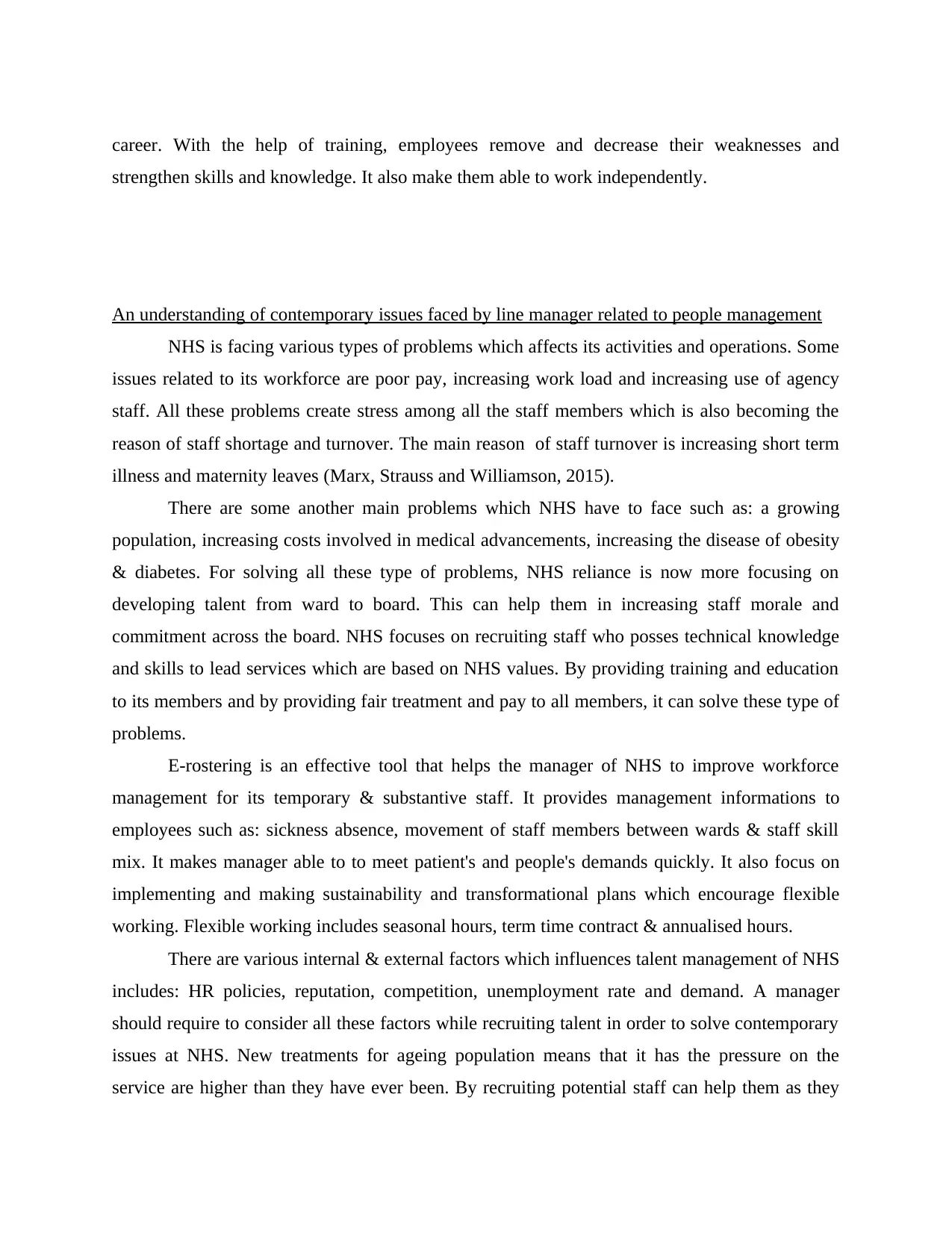
career. With the help of training, employees remove and decrease their weaknesses and
strengthen skills and knowledge. It also make them able to work independently.
An understanding of contemporary issues faced by line manager related to people management
NHS is facing various types of problems which affects its activities and operations. Some
issues related to its workforce are poor pay, increasing work load and increasing use of agency
staff. All these problems create stress among all the staff members which is also becoming the
reason of staff shortage and turnover. The main reason of staff turnover is increasing short term
illness and maternity leaves (Marx, Strauss and Williamson, 2015).
There are some another main problems which NHS have to face such as: a growing
population, increasing costs involved in medical advancements, increasing the disease of obesity
& diabetes. For solving all these type of problems, NHS reliance is now more focusing on
developing talent from ward to board. This can help them in increasing staff morale and
commitment across the board. NHS focuses on recruiting staff who posses technical knowledge
and skills to lead services which are based on NHS values. By providing training and education
to its members and by providing fair treatment and pay to all members, it can solve these type of
problems.
E-rostering is an effective tool that helps the manager of NHS to improve workforce
management for its temporary & substantive staff. It provides management informations to
employees such as: sickness absence, movement of staff members between wards & staff skill
mix. It makes manager able to to meet patient's and people's demands quickly. It also focus on
implementing and making sustainability and transformational plans which encourage flexible
working. Flexible working includes seasonal hours, term time contract & annualised hours.
There are various internal & external factors which influences talent management of NHS
includes: HR policies, reputation, competition, unemployment rate and demand. A manager
should require to consider all these factors while recruiting talent in order to solve contemporary
issues at NHS. New treatments for ageing population means that it has the pressure on the
service are higher than they have ever been. By recruiting potential staff can help them as they
strengthen skills and knowledge. It also make them able to work independently.
An understanding of contemporary issues faced by line manager related to people management
NHS is facing various types of problems which affects its activities and operations. Some
issues related to its workforce are poor pay, increasing work load and increasing use of agency
staff. All these problems create stress among all the staff members which is also becoming the
reason of staff shortage and turnover. The main reason of staff turnover is increasing short term
illness and maternity leaves (Marx, Strauss and Williamson, 2015).
There are some another main problems which NHS have to face such as: a growing
population, increasing costs involved in medical advancements, increasing the disease of obesity
& diabetes. For solving all these type of problems, NHS reliance is now more focusing on
developing talent from ward to board. This can help them in increasing staff morale and
commitment across the board. NHS focuses on recruiting staff who posses technical knowledge
and skills to lead services which are based on NHS values. By providing training and education
to its members and by providing fair treatment and pay to all members, it can solve these type of
problems.
E-rostering is an effective tool that helps the manager of NHS to improve workforce
management for its temporary & substantive staff. It provides management informations to
employees such as: sickness absence, movement of staff members between wards & staff skill
mix. It makes manager able to to meet patient's and people's demands quickly. It also focus on
implementing and making sustainability and transformational plans which encourage flexible
working. Flexible working includes seasonal hours, term time contract & annualised hours.
There are various internal & external factors which influences talent management of NHS
includes: HR policies, reputation, competition, unemployment rate and demand. A manager
should require to consider all these factors while recruiting talent in order to solve contemporary
issues at NHS. New treatments for ageing population means that it has the pressure on the
service are higher than they have ever been. By recruiting potential staff can help them as they
⊘ This is a preview!⊘
Do you want full access?
Subscribe today to unlock all pages.

Trusted by 1+ million students worldwide
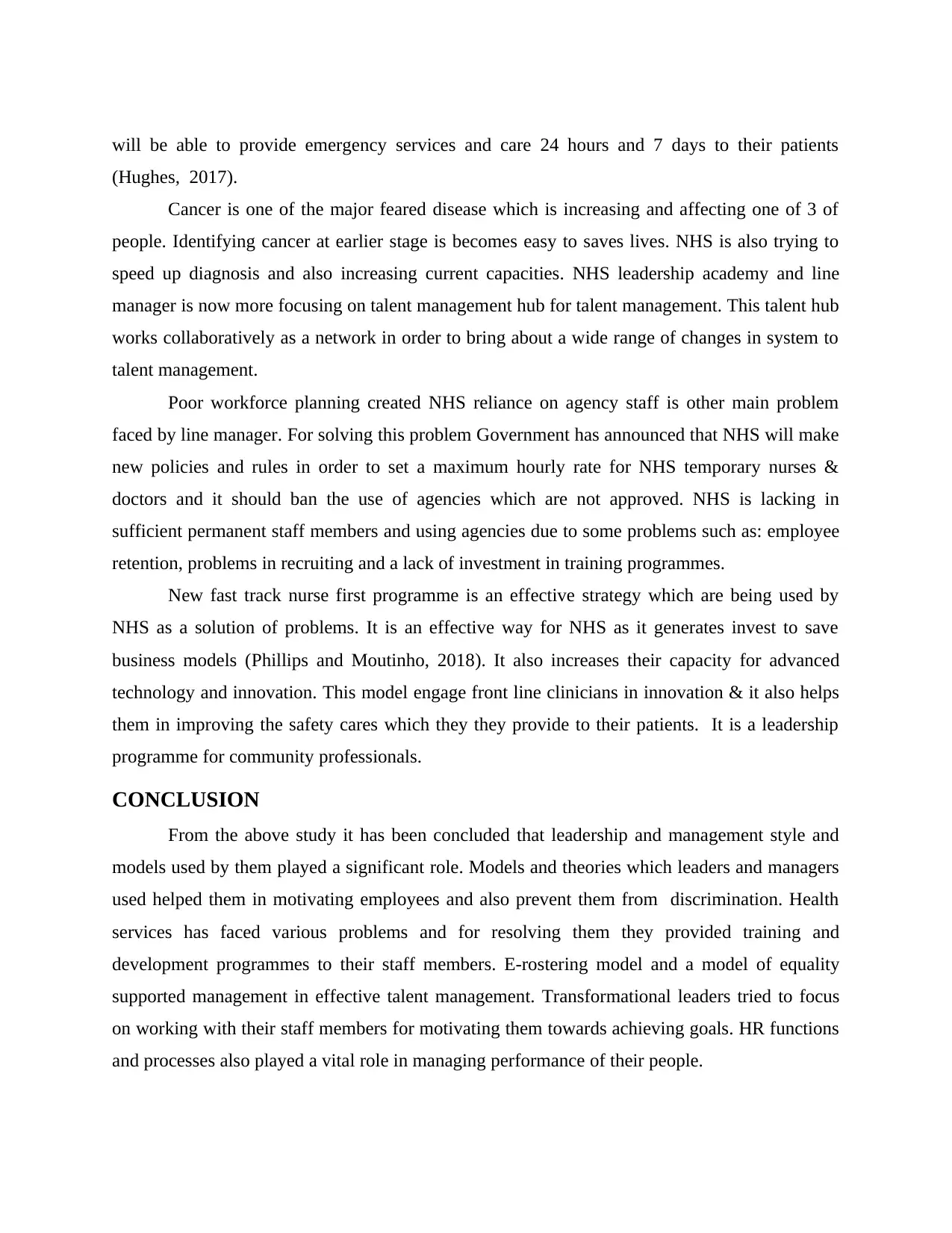
will be able to provide emergency services and care 24 hours and 7 days to their patients
(Hughes, 2017).
Cancer is one of the major feared disease which is increasing and affecting one of 3 of
people. Identifying cancer at earlier stage is becomes easy to saves lives. NHS is also trying to
speed up diagnosis and also increasing current capacities. NHS leadership academy and line
manager is now more focusing on talent management hub for talent management. This talent hub
works collaboratively as a network in order to bring about a wide range of changes in system to
talent management.
Poor workforce planning created NHS reliance on agency staff is other main problem
faced by line manager. For solving this problem Government has announced that NHS will make
new policies and rules in order to set a maximum hourly rate for NHS temporary nurses &
doctors and it should ban the use of agencies which are not approved. NHS is lacking in
sufficient permanent staff members and using agencies due to some problems such as: employee
retention, problems in recruiting and a lack of investment in training programmes.
New fast track nurse first programme is an effective strategy which are being used by
NHS as a solution of problems. It is an effective way for NHS as it generates invest to save
business models (Phillips and Moutinho, 2018). It also increases their capacity for advanced
technology and innovation. This model engage front line clinicians in innovation & it also helps
them in improving the safety cares which they they provide to their patients. It is a leadership
programme for community professionals.
CONCLUSION
From the above study it has been concluded that leadership and management style and
models used by them played a significant role. Models and theories which leaders and managers
used helped them in motivating employees and also prevent them from discrimination. Health
services has faced various problems and for resolving them they provided training and
development programmes to their staff members. E-rostering model and a model of equality
supported management in effective talent management. Transformational leaders tried to focus
on working with their staff members for motivating them towards achieving goals. HR functions
and processes also played a vital role in managing performance of their people.
(Hughes, 2017).
Cancer is one of the major feared disease which is increasing and affecting one of 3 of
people. Identifying cancer at earlier stage is becomes easy to saves lives. NHS is also trying to
speed up diagnosis and also increasing current capacities. NHS leadership academy and line
manager is now more focusing on talent management hub for talent management. This talent hub
works collaboratively as a network in order to bring about a wide range of changes in system to
talent management.
Poor workforce planning created NHS reliance on agency staff is other main problem
faced by line manager. For solving this problem Government has announced that NHS will make
new policies and rules in order to set a maximum hourly rate for NHS temporary nurses &
doctors and it should ban the use of agencies which are not approved. NHS is lacking in
sufficient permanent staff members and using agencies due to some problems such as: employee
retention, problems in recruiting and a lack of investment in training programmes.
New fast track nurse first programme is an effective strategy which are being used by
NHS as a solution of problems. It is an effective way for NHS as it generates invest to save
business models (Phillips and Moutinho, 2018). It also increases their capacity for advanced
technology and innovation. This model engage front line clinicians in innovation & it also helps
them in improving the safety cares which they they provide to their patients. It is a leadership
programme for community professionals.
CONCLUSION
From the above study it has been concluded that leadership and management style and
models used by them played a significant role. Models and theories which leaders and managers
used helped them in motivating employees and also prevent them from discrimination. Health
services has faced various problems and for resolving them they provided training and
development programmes to their staff members. E-rostering model and a model of equality
supported management in effective talent management. Transformational leaders tried to focus
on working with their staff members for motivating them towards achieving goals. HR functions
and processes also played a vital role in managing performance of their people.
Paraphrase This Document
Need a fresh take? Get an instant paraphrase of this document with our AI Paraphraser
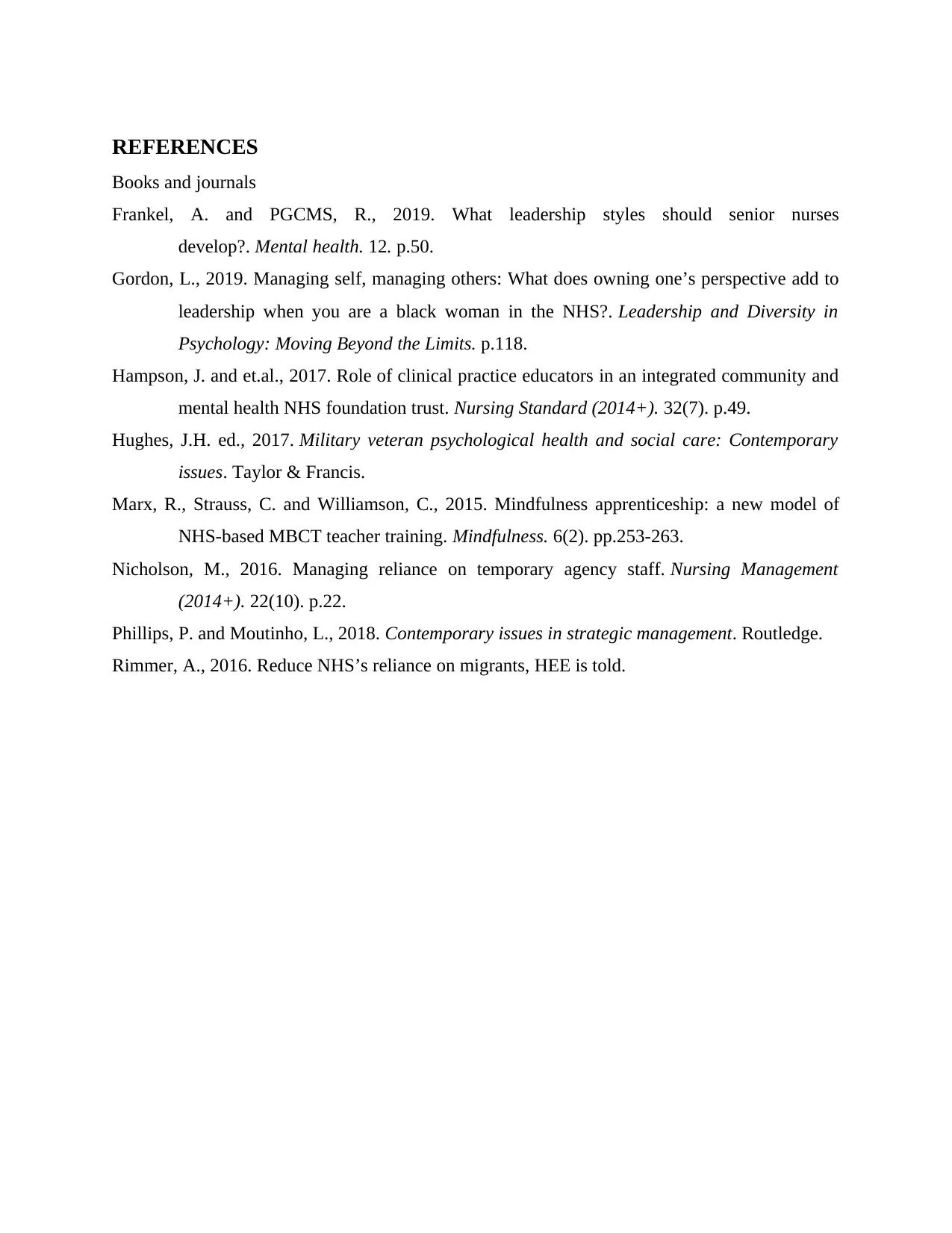
REFERENCES
Books and journals
Frankel, A. and PGCMS, R., 2019. What leadership styles should senior nurses
develop?. Mental health. 12. p.50.
Gordon, L., 2019. Managing self, managing others: What does owning one’s perspective add to
leadership when you are a black woman in the NHS?. Leadership and Diversity in
Psychology: Moving Beyond the Limits. p.118.
Hampson, J. and et.al., 2017. Role of clinical practice educators in an integrated community and
mental health NHS foundation trust. Nursing Standard (2014+). 32(7). p.49.
Hughes, J.H. ed., 2017. Military veteran psychological health and social care: Contemporary
issues. Taylor & Francis.
Marx, R., Strauss, C. and Williamson, C., 2015. Mindfulness apprenticeship: a new model of
NHS-based MBCT teacher training. Mindfulness. 6(2). pp.253-263.
Nicholson, M., 2016. Managing reliance on temporary agency staff. Nursing Management
(2014+). 22(10). p.22.
Phillips, P. and Moutinho, L., 2018. Contemporary issues in strategic management. Routledge.
Rimmer, A., 2016. Reduce NHS’s reliance on migrants, HEE is told.
Books and journals
Frankel, A. and PGCMS, R., 2019. What leadership styles should senior nurses
develop?. Mental health. 12. p.50.
Gordon, L., 2019. Managing self, managing others: What does owning one’s perspective add to
leadership when you are a black woman in the NHS?. Leadership and Diversity in
Psychology: Moving Beyond the Limits. p.118.
Hampson, J. and et.al., 2017. Role of clinical practice educators in an integrated community and
mental health NHS foundation trust. Nursing Standard (2014+). 32(7). p.49.
Hughes, J.H. ed., 2017. Military veteran psychological health and social care: Contemporary
issues. Taylor & Francis.
Marx, R., Strauss, C. and Williamson, C., 2015. Mindfulness apprenticeship: a new model of
NHS-based MBCT teacher training. Mindfulness. 6(2). pp.253-263.
Nicholson, M., 2016. Managing reliance on temporary agency staff. Nursing Management
(2014+). 22(10). p.22.
Phillips, P. and Moutinho, L., 2018. Contemporary issues in strategic management. Routledge.
Rimmer, A., 2016. Reduce NHS’s reliance on migrants, HEE is told.
1 out of 8
Related Documents
Your All-in-One AI-Powered Toolkit for Academic Success.
+13062052269
info@desklib.com
Available 24*7 on WhatsApp / Email
![[object Object]](/_next/static/media/star-bottom.7253800d.svg)
Unlock your academic potential
Copyright © 2020–2026 A2Z Services. All Rights Reserved. Developed and managed by ZUCOL.




